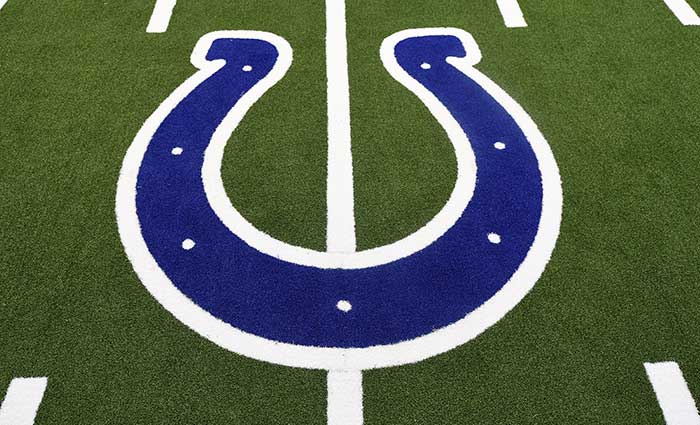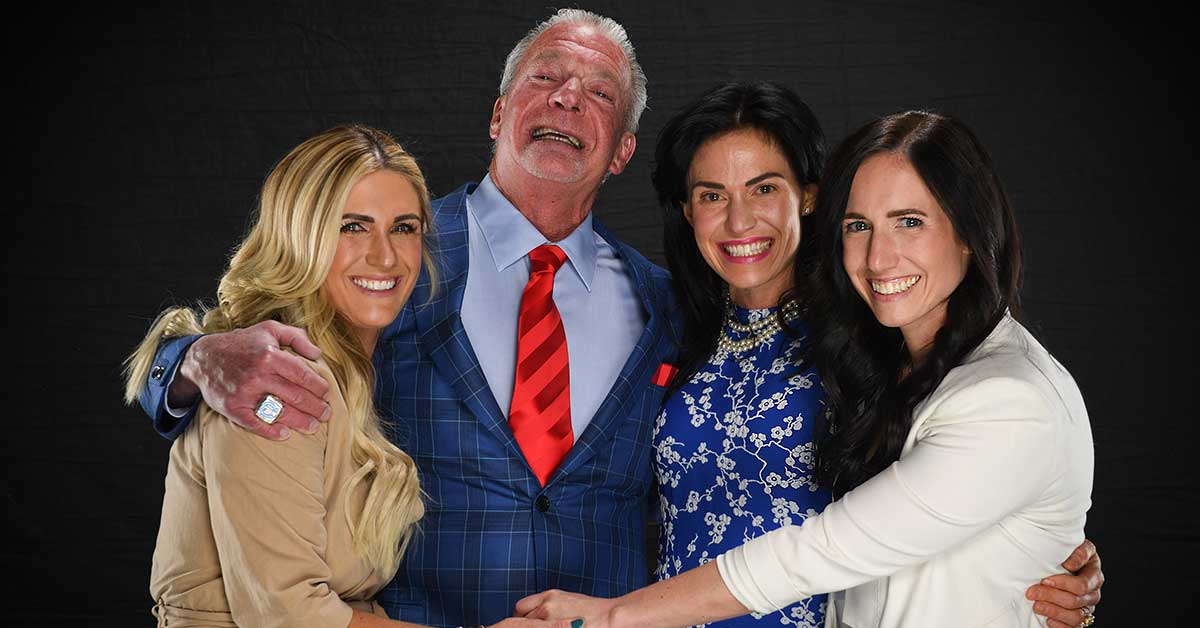(From Left to Right: Casey Foyt, Jim Irsay, Carlie Irsay-Gordon, and Kalen Jackson
Photo courtesy of Indianapolis Colts.)
By Anthony Castrovince
When the transit trucks arrived late in the evening of March 29, 1984, the Indianapolis Colts were the new kids in town. The city welcomed Robert Irsay’s National Football League bunch from Baltimore with open arms, as Mayor William Hudnut proclaimed it to be “one of the greatest days in the history of the city.”
That was a grand entrance, as well as a lofty claim to live up to. And over the last 37 years, the Colts have done their part to not just serve as a source of civic pride in Indianapolis but to help the area grow. With ownership reins handed down from the late Robert Irsay to his son, Jim and Jim’s daughters (Carlie Irsay-Gordon, Casey Foyt, and Kalen Jackson), the Colts are a family, and Indy is home.
“It really is a beautiful thing to be family-owned,” Jackson says. “We can shape our organization to be reflective of our ideals as a family.”
Those ideals have helped the Colts navigate the competition for people’s entertainment dollar and the once-in-a-lifetime COVID-19 pandemic, all while enriching important causes and community endeavors. Just as the players on the gridiron must have a plan and execute it in order to succeed, the Colts, as a franchise, are thoughtful and strategic in terms of how they hire, how they serve, and how they meet fans’ needs.
It has made them winners in so many ways.

(Photo courtesy of Indianapolis Colts.)
Making extra points
While Indianapolis ranks in the lower half among NFL teams in television market size, that more tight-knit community allows the Colts to foster deeper ties to its fan base and local businesses.
“Hoosier hospitality is a real thing,” says Jackson, “and we feel it so strongly.”
While building a Super Bowl-worthy roster is the foremost goal of any NFL team, the Colts also aim to give their fans a memorable experience at Lucas Oil Stadium.
“We feel really blessed to have the stadium we have,” Jackson says. “It’s a beautiful place for people to come. It brings other economic benefits to our town and hopefully has put Indianapolis on the map more than in the past. We are constantly looking at what can we do differently and what we can add as a benefit to our fans.”
The Colts conduct fan surveys that help shape every element of the gameday experience, from the music blared on the in-house speakers to the giveaways at the turnstiles.
“It’s no secret that watching at home on TV gets more appealing, with the way it’s produced,” says Jackson. “So we’re constantly finding ways to make coming to games a great experience.”
When the coronavirus pandemic drastically limited the number of fans allowed at games during the 2020 season—average attendance dropped from around 60,000 to less than 13,000 due to health and safety restrictions—the Colts called the necessary audibles.
“It was a crazy time to be working in this industry, and it changed constantly,” Jackson says. “But we communicated with our staff as best we could and were very thankful to have leadership at the league level and support from city and state officials, our sponsors, and community partners.”
Tackling important issues
The Colts have boosted not just civic pride but civic causes. With a special emphasis on health and wellness, the Colts have, to date, built 13 playgrounds at local schools as a means of giving children access to play for 60 minutes a day. In 2018, the team worked with the city of Indianapolis to construct Colts Canal Playspace, the downtown area’s first playground.
But the most impactful endeavor may have come in 2020, with the launch of Kicking the Stigma, an initiative to raise awareness about mental health disorders and to remove the shame and stigma too often associated with these illnesses. The Irsay family had already chosen mental health to be an area of charitable focus, just prior to the pandemic. COVID-19 might have forced the Colts to ditch plans for an in-person kick-off event, but it only accelerated their desire to help.
“During COVID, we saw mental health become even more of an issue every day,” Jackson says.
A virtual fundraiser included heartfelt videos from Colts legends like Peyton Manning, Reggie Wayne and Tony Dungy, as well as celebrities including rapper Snoop Dogg, comedian Jim Gaffigan and actor Rob Lowe. In less than a week, the Colts raised $2,273,449 for the cause, and Irsay personally matched that amount to bring the total to more than $4.5 million.
“The stats related to mental health are so staggering and upsetting,” Jackson says. “Everyone can connect to mental health in some way. So the overarching goal was to talk about what we have gone through and how it’s made us stronger.”

(Photo courtesy of Indianapolis Colts.)
Driving Diversity
The Colts aim to make their community and themselves stronger. The team already had a diverse staff, and, with Irsay’s daughters in positions of influence, the Colts have strong female leadership in what has traditionally been a male-dominated industry.
But in late 2020, the team further increased those efforts by hiring Brian Richardson as its first director for diversity, equity and inclusion. For the Colts, it’s all part of an effort for the home team to properly represent the team’s fans.
Huddling up
The Colts understand the value of teamwork, and in working with Huntington over the last three decades, the team and its bank operate on the same page of the playbook.
“They truly embrace our relationship and really engage with Colts fans, from ticket promotions to poster pass-outs at local branches,” Jackson says. “They’re always willing to help, even beyond what we’re asking.”
Jackson pointed to the Kicking the Stigma initiative as an example.
“Huntington came on as a sponsor,” she says. “But they added on by asking if they could do a PSA, using their own time that they purchased through local media to promote what we were doing. It’s something we did not ask or expect of them. They connect with us in a way that’s so personal.”
For more information, visit colts.com.

